Misko Barbara is an actor of the Arabesque Theater, a musician, translator, co-founder, and soloist of the Dead Roster band, a legend of Ukrainian rock and roll.
November 14 should have marked the 50th anniversary of the legend of Ukrainian rock and roll, soloist of the band "Dead Rooster", actor of the Kharkiv Experimental Theater "Arabesque", Mykhailo (Misko) Barbara. But, on October 11, less than a month before his anniversary, Mykhailo died — in Kharkiv, in the arms of his wife, director of "Arabesque", Svetlana Oleshko. Misko's death came as a huge shock to the Ukrainian cultural community, so on the eve of the would-be anniversary we decided to record a conversation with Svitlana about the coexistence of two powerful artists as a couple, co-creation, adulthood, Barbara's role in the theater, and other intimate and social things.
The conversation was led by Ivanna Skyba-Yakubova, manager and publicist of cultural projects and friend of Svetlana and Mikhail. The interview was recorded in partnership with the Kharkiv media project Nakipilo.
Since we are doing this conversation on the eve of Misko’s anniversary, let's start with it. How did you plan to celebrate it? How did Misko reflect this age in general? After all, by and large, in our culture, 50 is still perceived as something so borderline and epoch-making.
— He was preparing for it. He treated it with irony but really prepared. I could have assumed he wanted to hide, but he didn't. On the contrary, three concerts were planned in Lviv: in Lyalka — "Monologues about What is the Most Important", in LV Cafe jazz club, where he had a new project to do with Mark Tokar and Andriy Arnautov, and a birthday party in the pub Bratyska. And literally on Sunday [Misko died on Monday — author] he corresponded with artists (Serhiy Savchenko, Genyk Ravsky, and Tonya Denysiuk), with whom he planned to make merch, and one T-shirt was supposed to have the inscription [winks] "50 more to go".
People go in different ways, and, you see, he went on such a high note! Everyone saw and said that he looked great, had so many plans, and so much energy.
For him, fifty was a new stage rather than a summing up, wasn't it?
— Absolutely! There was a sense of adulthood, in a good way. Adulthood, responsibility, the savor of life is calm… Life satisfaction. This album… he is, again, an adult [this fall Misko Barbara together with Yurko Efremov recorded a new album 13 Songs about Love; You can listen to the album on YouTube and on all digital platforms — ed.] and terribly modern. I was so moved: Ostap Ukrainets made a radio broadcast, where he told the story not only of "Dead Rooster", but in fact about the time when the first songs were performed, and schoolchildren came to the chat on air, and began to admit, “We are only now hearing that; we, such idiots, listened to Russian-language songs when we have our own music."
You lived together for almost 20 years. This is a length of time where people change a lot and it often happens that in 15-20 years they are not the same people who came together. But in your case, it looked like you were somehow syncing and changing together…
— You know, it's hard for me to say. We were probably changing. Misko changed, first of all, professionally. He gave up a fairly comfortable life because he was the editor-in-chief of Radio Initiative in Lviv. It was his city, where he greeted someone with every step.
But he wanted a theater. I was against, in fact, his participation. It was Zhadan who wrote the role for him [the first play Arabesque with the participation of Michael Barbara — Merry Christmas, Jesus Christ, 2001 — author]. I said that Misko doesn't suit us; he can't do it. He's a musician, a star, and I need an actor. After all, there was no stardom. During rehearsals and trainings, he was on the same level with everyone. He had to wear costumes (which made him blend into the scenery). He wore them. He tried very hard, and it was the way we grew together.
Speaking of personal things… Misko left his parents very early and had no particular well-being in adulthood. On the contrary, I lived in a big family all the time. In the beginning, he always bought everything for one person: every day a little food, a pack of cigarettes. Whereas I endlessly stocked up and cooked borscht for the family. We laughed, for the most part, about it, but then he developed this habit of stockpiling. I understand that it may have seemed strange to people from the outside — star pickling cucumbers and tomatoes — but we were thrilled by it.
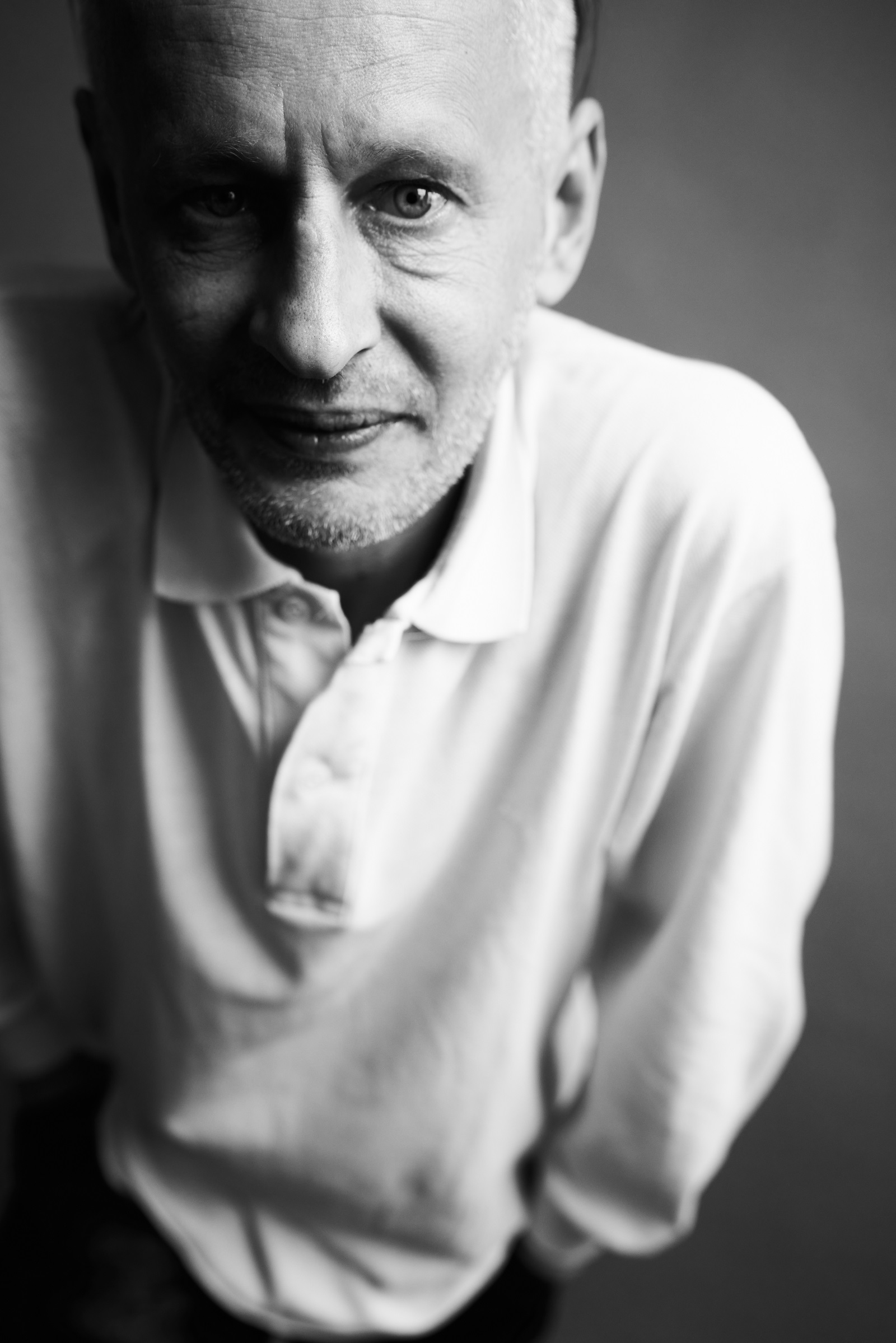
How did everything happen in everyday life?
— We did everything together. Many did not understand this. For example, our parents said, “Why do you always come together?” And we had mutual insurance — an agreement that we would not enter into any project individually. In fact, we did not physically separate. We did not have private correspondence, only work: sending the lyrics, a list of songs, or a technical rider.
We just didn't leave each other physically. At most, Misko went to the supermarket around the corner and it looked like this, "I’m going to Spar, there and back." I understood how long it would take. Then he came back, took out the food, and said, "You know, there weren't your cigarettes, I'll go get them." That's all parting.
Today makes 27 days since his death. We have never been so long apart. I went to the kitchen — Misko was with me. Although he hadn't cooked before, in the end, he became such a sous-chef. We cooked together. That made sense.
We quarreled mainly on professional topics. I was hooked with him in the theater, and because he was my husband I could sometimes spare him. Sometimes it was unfair. We had no reason to quarrel in everyday life. Misko is that kind of man who never forgot to lower the lid on the toilet — both real and symbolic… That is, he thought about the people who lived nearby. About me. Once I said, "Let's figure out where to put the dishwasher." We loved guests, and cooked a lot. He looked, thought, and finally said, "In short, I'll be a dishwasher." And now in my muscular memory, there is no such option as washing dishes.
Tell me what. You were both powerful artists, each with their own creative ambitions. How did you coexist in this? Because for many it is a challenge that they do not go through.
— Yes, sometimes such couples break up due to creative competition… But I'm not on stage. I'm one of those directors who others don't know in person. Behind the scenes, respectively, I see well. Misko is an actor, a vocalist, and he needed someone always behind the scenes who just saw.
Now I need to make a program: on February 17 in the Recording House in Kyiv there will be a big concert for his anniversary. There will be Slavko Vakarchuk, the Telnyuk sisters, Sergey Zhadan, Sasha Koltsova, Maria Burmaka, Yurko Andrukhovych, TNMK, Andrey Sereda, Eyelashes, Sergey Fomenko, Khrystyna Soloviy, Myroslav Kuvaldin, and Ivan Lenyo. The drama of the concert has always been terribly important for Misko. He always made a list of what was going on and what was being done this time, and I didn't interfere there. And now there is no one to consult with on how to arrange these songs.
He always read scripts, edited, or when he translated — I typed. We found out at some point that, of course, he knows Polish better, and me Ukrainian.
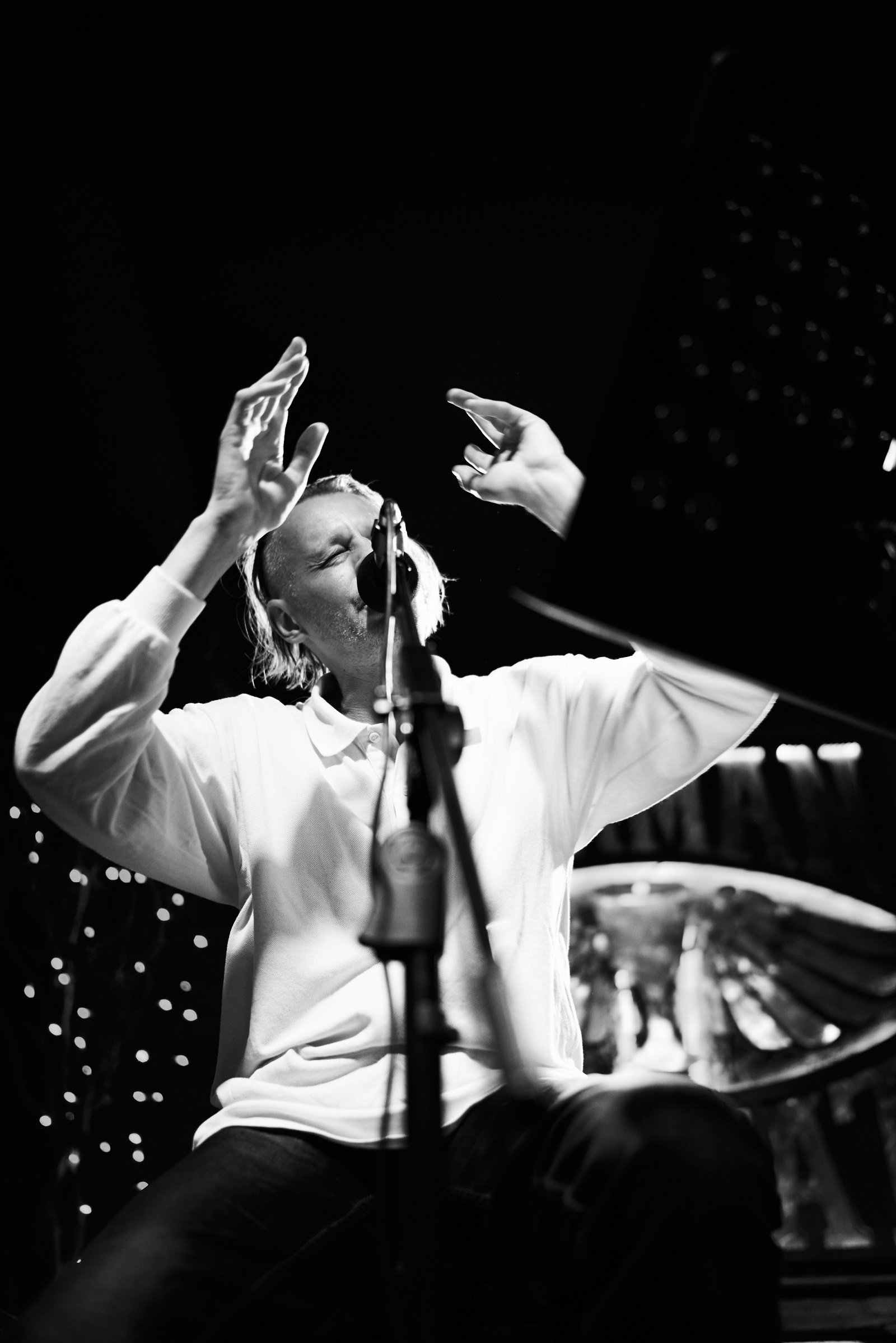
In the performances at Arabesques in the years when you were already working together, what was his role in co-creation? It is unlikely that he was just an actor-executor of your directorial plans.
— He wasn't, of course. First, all the music was always on him. If he did not write it himself, it was him who worked with composers and musicians. If other actors sang, he was a vocal coach. He showed me how to sing a text, write a musical score, and now it's also a huge hole… I used to do it myself, but now I have forgotten how to do it myself.
Secondly, he was an actor-co-writer: he built the role, and this was his sculpture… Sometimes it was capricious, of course.
In the first version of Monologues on What is the Most Important [the monograph "Arabesque" on culture, based on the text by Mazena Sadokha translated and adapted by Barbara Misko and performed by the author], for some reason, I decided that he should be in a suit and shoes his aunt from Belgium gave him. And so he acted in a few plays in it, and then said that he would wear these shoes only for his funeral, which, in fact, happened.
And in other cases, on the contrary, there is Merry Christmas, Jesus Christ, our first performance with him. The artist invented for him such a terrible costume: red leotard, fur, devilish shoes, and a crown from under the bottle "Obolon". I told l the artist — I hope that Misko will say, "I will not wear it!" And then I'll kick him out for being unprofessional. And he calmly accepted the suit.
At first, they even acted in pointe shoes there. It was quite mean on our part with Oleksandr Bilozub, the production designer. In the Ukrainian theater, you can still put up with costumes, and shoes are a disaster, so what to wear them? I say "come on pointes!" — size 45, specially ordered. There are no men's pointe shoes. It was terribly inconvenient, but he didn't even care. The others were whining, although after a few rehearsals they ran in those pointe shoes as they do in slippers. Barbara is the only one who did not complain.
I am thinking about this historical trilogy of yours and the three catastrophes for the Ukrainian people of the 20th century: the Holodomor, the Volyn tragedy, and Chernobyl. Misko was not just an actor, but an intellectual, a researcher in his own way. Plus he grew up not in our East, but in the Galician context, so he could have had different points of view on some things and different perceptions. How did he work with you here? Did it help, or did you discuss it?
— We discussed and, in fact, he was a guide for me for Polish culture and language. Although, unlike Miska, I studied Polish at university, and I don't know it nearly as well.
Yesterday, I had an interview with Ira Matsevko [historian, vice-rector of the Kharkiv School of Architecture, formerly head of public history programs at the Center for Urban History in Lviv — author] and she told me the same thing: catching Polish radio, listening to rock, catching Polish TV. They just grew up on it.
Or East Opera commissioned us to make a synopsis for an opera about Shevchenko. I was busy with various applications for grants. I said, "Misko, let's read Shevchenko, and I will read Zabuzhko’s Shevchenko's myth of Ukraine." While I was going to read Zabuzhko, Misko actually invented the libretto.
We sometimes spoke to each other in some dolphin language. In directing, communication is the main essence of the profession. I need to agree with everyone and explain the task to everyone and make decisions. Misko gave me such happiness to not make decisions and to not explain anything.
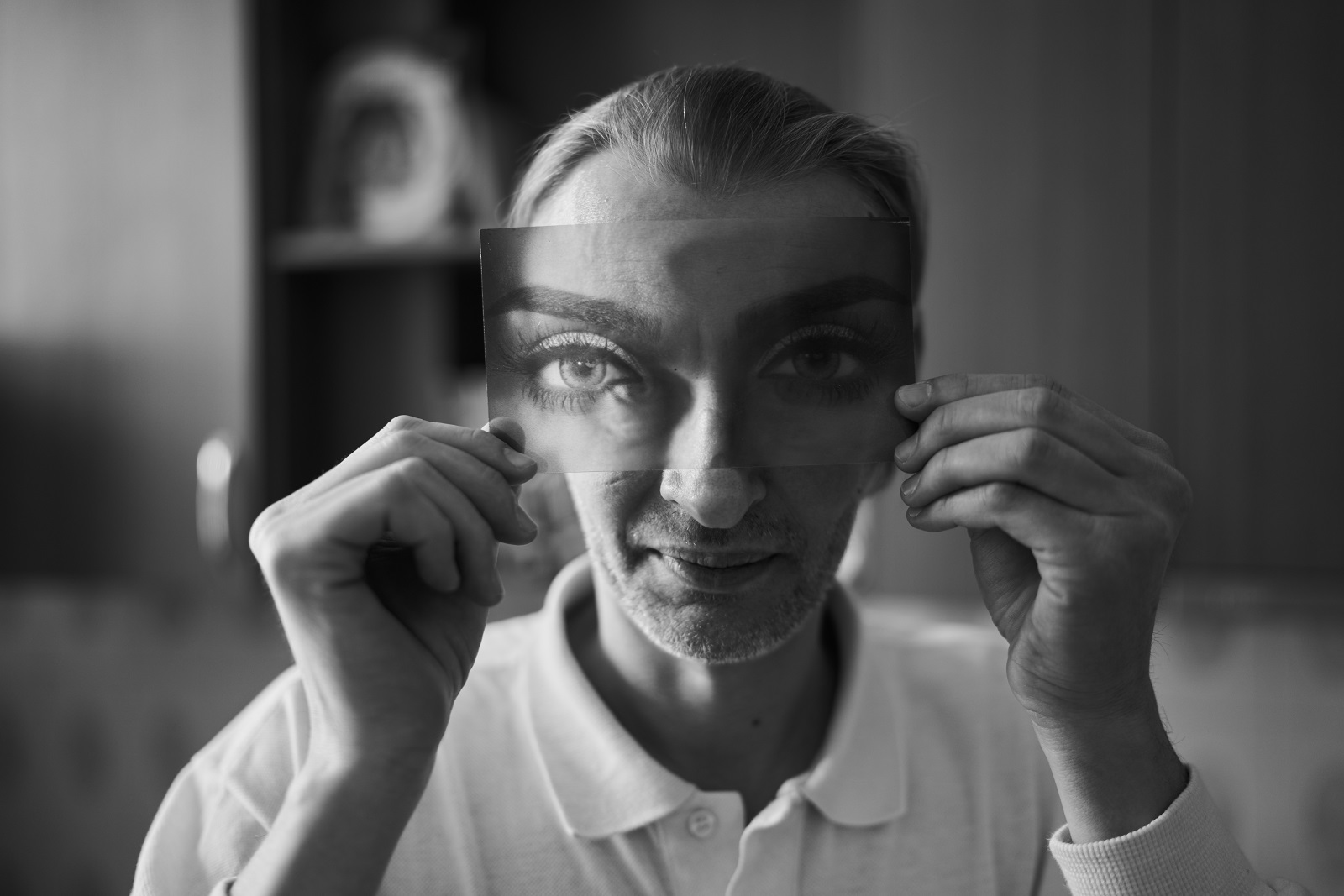
I still have a personal question, this is what interests me in a feminine way. With age, people not only change their worldview but also physically. Physiology changes, and so the rhythm of life. Some things that you did when you were 20, you no longer do. How did you help each other grow older and accept each other's aging?
— We were terribly pleased with each other and our age. This adult corporeality is completely different. By the way, also sex. I may intrigue young people, but adult sex is much better than 20-year-olds’ sex. Here is everything — respect, experience, tenderness, and tactility… In adults, it is much thinner and more accurate, gentler. Adolescent sex is a godsend, as I understand it now.
It is clear that we were not old enough to strain our physiology, but if I was sick, Misko would fly here and bring me tea. I generally lived with him as a princess. What's more? I don't know. Adults fart more often. And I say something — listen, come on, maybe we'll come up with a funny word to say in such instances. And we came up with it. It was the word "hedgehog", and we laughed. And this is also something that most people do not know in their youth: at the same time irony and tenderness, and an acceptance of reality.
Listen, it will probably hurt, for sure, but let's try to reconstruct your typical day…
— He woke up first, listening to Nowy Swiat radio. Then he looked at me, "Time for coffee?" Then he ground coffee and brewed it Turkish style. If the milk turned out to be spoiled, he would jump out and run after fresh milk.
Then there was the question "More coffee or breakfast?" In fact, it was the best time of the day, because I was brazenly lying under a blanket, drinking this coffee and practicing German. He really liked that I started learning German. Misko knew it well, he studied at a German school.
Then there was breakfast and business. We managed the theater and everyone's affairs. Messages, emails… If they were Polish, he corresponded — it could be from my inbox. We always prepared something for ourselves and our guests. If there were guests, then there could be purchases. I wrote the lists we needed, and he was already going to the store or the bazaar himself. He knew where he bought meat, fruits, and vegetables. I had no idea about that.
Then we cooked and ate together. Then rehearsal. Either in Arabesques, or he and Yurko [Efremov] at our house.
In the evening, we watched TV series together. It was both a break and an element of a profession. From the very last we started watching "Collapse" [a documentary series from the Public about Ukraine's independence — author]. We watched one episode, and they added one per week, and Misko said, “Let’s wait until all the episodes are added; we'll see them all at once.” Well, we never watched them.
Lviv and Kharkiv, were the two main cities for him. What changed in his habits after moving? Maybe he missed Lviv in something, or did something annoy him here in Kharkiv?
— The same as you and me, and all of us, "our people." The dominance of pop, shame, grayness, Kernes [city major — ed]... You see, he left Lviv very consciously - for a profession, for love — and it turned out that with whom he lived was more important for him than where he lived. In the end, we say, as with Andrukhovych, "Don't go to Lviv, there is no such city anymore." The Lviv that formed him and which he created no longer exists. For example, we never went to Dzyga after Marek's death. [Markiyan Ivashchyshyn, one of the leaders of the Granite Revolution and co-founder of the Dzyga Art Center in Lviv, died in 2019. After the sale of Dzyga to new owners, its policy / aesthetics greatly changed, which was categorically not accepted by a part of the cultural party — author]. We just couldn't do it physically.
And in general, we joked that now in Lviv there are more people we love in Lychakiv Cemetery than in the bars.
Our friend, Mykola Kniazhytskyi — by the way, on the day of Miska's funeral his son got married. He attended the marriage, got in the car and went to bury Miska — he said at the funeral "God, he loved your Kharkiv so much!". And Galicians really often do not understand how it is possible to love Kharkiv, but you and I understand what kind of Kharkiv he loved?
Ours.
— Ours. The third, according to Shevelyov, or the Fifth, which we are trying to build. We lived here in the center, between the Slovo house and Khvylovy's grave. Now I live between the Slovo house and Misko’s grave.
By the way, there are a lot of people offended that Misko is not buried in Lychakivsky, but it was his will, and that's enough.
For the last couple of years, if we were in Lviv, we always went to Lychakiv, to Marek, to Sashko Kryvenko, and to Nazar Honchar. And for some reason, I asked, "Mis’, where would you like to go?". Although none of us thought about death, he did not hesitate to answer "in Kharkiv, near you". All in all, there is no discussion.

Did you feel that his appearance in Kharkiv somehow changed the cultural context of the city?
— But who thinks in such categories? We lived a completely real, physical life. It was a huge problem for us to run social networks. We understood that now it is impossible otherwise, especially in our profession, but we did not have to share anything with anyone, we shared everything with each other — absolutely everything, intellectually, emotionally, physically…
When Ivan [son of Svitlana Oleshko and Serhiy Zhadan — author] was still young, we often went for a walk to the Zoo, and he stubbornly did not want to see the elephant. It did not fit in his small, child lens. The scale for the two is not the same. And here I have the impression that for many people Misko was such an elephant. The scale of his impact we still do not understand. A distinction must be made between popularity and influence. Les Kurbas was not popular. Volodymyr Sosyura and Ostap Vyshnya were popular, but the influences are far-reaching — it is completely different. Misko’s talent is more about influence than popularity.
These days, many musicians have begun to write songs based on the poems of our poets. And, in fact, Barbara launched this trend a goddamn time. And there are whole generations of people who started reading Ukrainian poetry precisely because Misko sang it.
For some reason, I am now thinking about one of my favorite performances of yours, “Radio Chanson. Eight stories about Yura Zoifer "- in general, I bow to you for doing this, dragging Zoifer into our cultural context. Unfortunately, few people still know about him (I once lived on the street named after him and it always had to be explained, who is it). So tell me, would this play be pos[Jura Zoifer is an Austrian poet, playwright, author of sharp plays for political cabaret, anti-Nazi, Jew by nationality, Kharkivite by birth, and one of those who introduces twentieth-century drama characters from marginalized classes — ed.]
— Impossible. First of all, it is musically perfect because Misko listened to so much klezmer music that even the musicians from the Kharkiv Klezmer Band were surprised that he was better at it than they were. Klezmer is folk music. Zhadan [Serhiy Zhadan — the playwright of this play — author] said that all his life he dreamed of folk music appearing in his poems.
And you know, something happened here that didn't happen in Embroidered [Embroidered. The King of Ukraine is an opera by Alla Zagaykevych based on a libretto by Serhiy Zhadan, which premiered at the East Opera on October 1-2. Mention of this opera arises in the conversation, in particular, because it was there that we met with Svetlana and Misko for the last time, agreed to have drinks in a couple of weeks, and in 9 days Misko was gone — ed.] — cooperation between author and director, author and specific team.
I asked Zhadan to translate a play by Zoifer for us because there was only one Ukrainian translation by Peter Rykhlo from Chernivtsi. In modern theater, it is better to do a translation for a specific production, for specific actors. And Zhadan read and said "Let me write you a play about Yura Zoifer myself, and he wrote.
This is a brilliant text, for which Misko picked up brilliant music, and it all came together. That's how it should be in modern theater: the joint work of the director, composers and author.
Zhadan is an obedient, attentive writer. When we did Merry Christmas with young, inexperienced musicians, he rewrote lyrics for them a hundred times so that they would go to music. Everything was written in a hot way, both music and lyrics, and while they were already in the process, worked on the production. They say, “You understand, you write only at the heavenly level, you have continuous higher worlds and only a little hell, but where is this middle, interlude, ordinary life?” He says, “Yeah, really.” And then he wrote a social advertisement — turtle soup in cubes, "In fact, turtles do not sing."
And without Misko, Radio Chanson is absolutely impossible. He worked everything out. He sang not only in his parts but also for the rest. No actor would be able to work out a role there on his own.
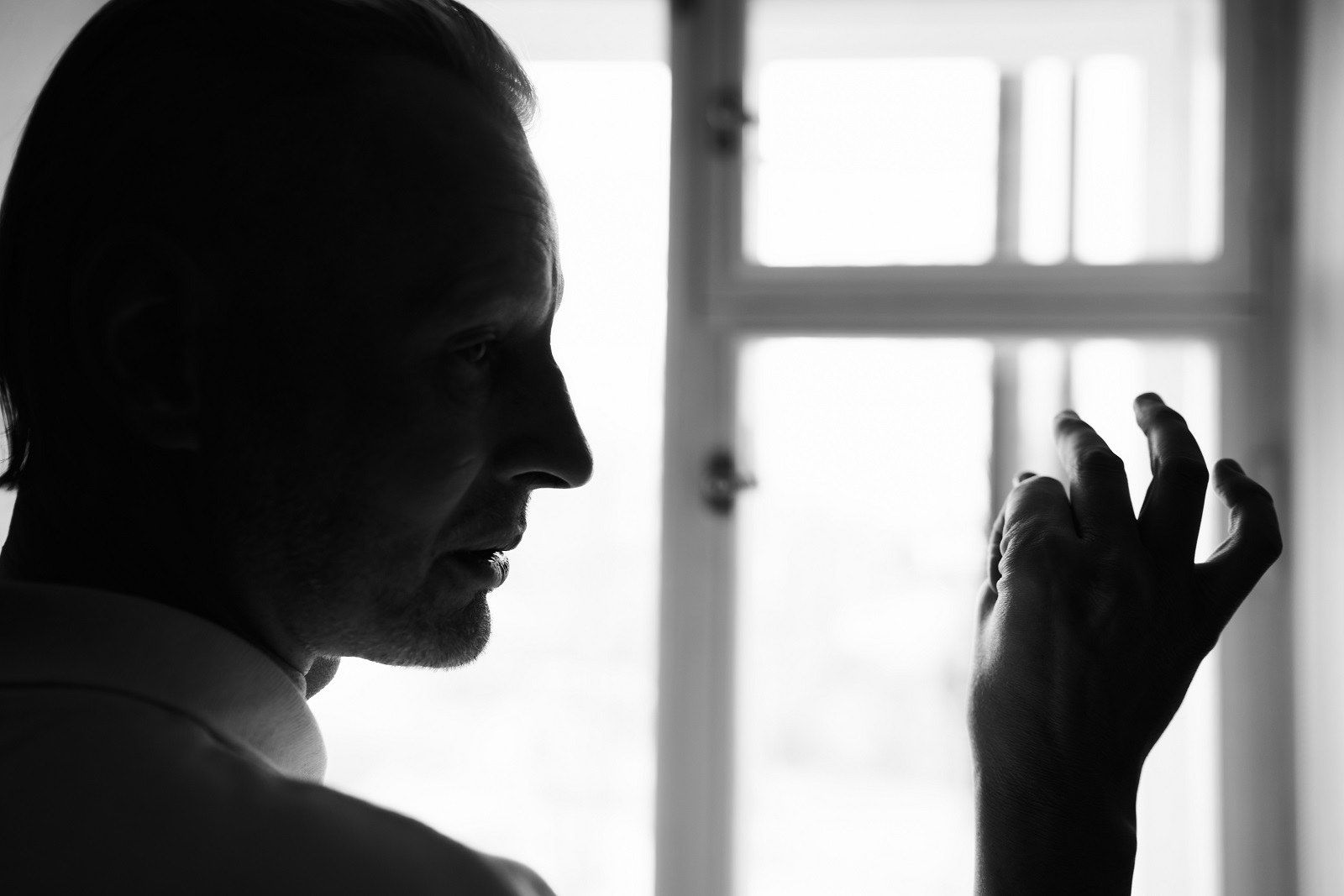
You have several performances based on Zhadan's lyrics. Misko did a lot of songs based on his lyrics. I know that many people are surprised by this, they say, “the first man, the second…” How did the private and the professional differ?
— Do you know that they once went to the Carpathians together to write a novel?
Oh, I even suspect why they didn't write.
— (blushes): No.
Yes, I'm talking about the fact that there must have been a lot of dry red wine in the mountains.
— No, then they were on cognac.
Well, you see, it is not by chance that Serhiy invited Misko then. It is clear that we knew each other before, and there was
The Apocalypse will Start From Here" [the 1999 festival, which was made by Serhiy Zhadan with the Kharkiv LitMuseum — author], and performances at all possible revolutions and protests, there was a movement "Ukraine without Kuchma".
And just when we had the premiere of Irvantsev's Little Play About Betrayal, we were not allowed to enter the Shevchenko Theater with it due to political actions, and Roddom [once a semi-closed cultural club in Kharkiv, now Kharkiv is working in its premises. School of architecture — ed.] let go. And after the street concerts, we were sitting in the Kharkiv Hotel, and back then no one had formulated it as "East and West together", but it was already obvious that we had to do something together. In fact, Zhadan said, "What could be more unifying than the idea of Christmas? That's why I will write a nativity scene for Misko’s role as well." He then signed it in the protagonists of Stromny Tip.
The music was written by the Kharkiv band Lyuk. We actually lived in Lviv for a month. And after a while, I had a relationship with Misko.
But Misko was married. I was married, and I had a child. We resisted this relationship for so long.
And then — you know, maybe it's not typical and too frank — but in the end, Serhiy told me, "I do not understand why you have no right to live with a man whom you really love."
Then it was the default that Misko could take any of Serhiy's lyrics and sing them, sometimes he asked him to send something new.
At Arabesques, we have three performances based on Serhiy's texts: Merry Christmas, Jesus Christ, Red Elvis and Radio Chanson. We lived in the same environment, and you can, of course, according to Dr. House, share friends after divorce, but we did not want to share. The air is the same, the streets are the same, the values are the same, some poems about one person are written, so it was easy to sing. Maybe it's weird, maybe it's not weird, maybe it is how it should be
What will happen to Arabesques next?
— As Scarlett O’Hara said, "I'll think about it tomorrow." The only thing I am sure of is that Misko would like the theater to exist. All the actors came for 9 days, and I said, "You know, friends, it won't be possible to hide behind Svitlana and Misko. That is, you will have to hide for yourself and for that guy."
Arabesques will probably become The Misko Barbara Theater, but now it hurts too much. In fact, we don't have a single performance without Misko right now. How can we replace him?
Misko was a very kind and very wise man. One of the few who, always having a clear position, did not say too much and never "got dirty".
— He was an aristocrat, both literally and by way of thinking and acting. Just a nobleman.
And yes, he was a very good man. If someone hurt him, he never minded anything like that. His worst act was that he went and died, and hurt so many people at the same time.
I don't want to make a monument out of him, but he really did not compromise with a conscience. He was present at all revolutions, did not hide his views, and clearly articulated his position. This also had its price: material. Sometimes there was no money at all. But we chose an adult position and said to each other that if money is the biggest problem in life, then we are happy people.
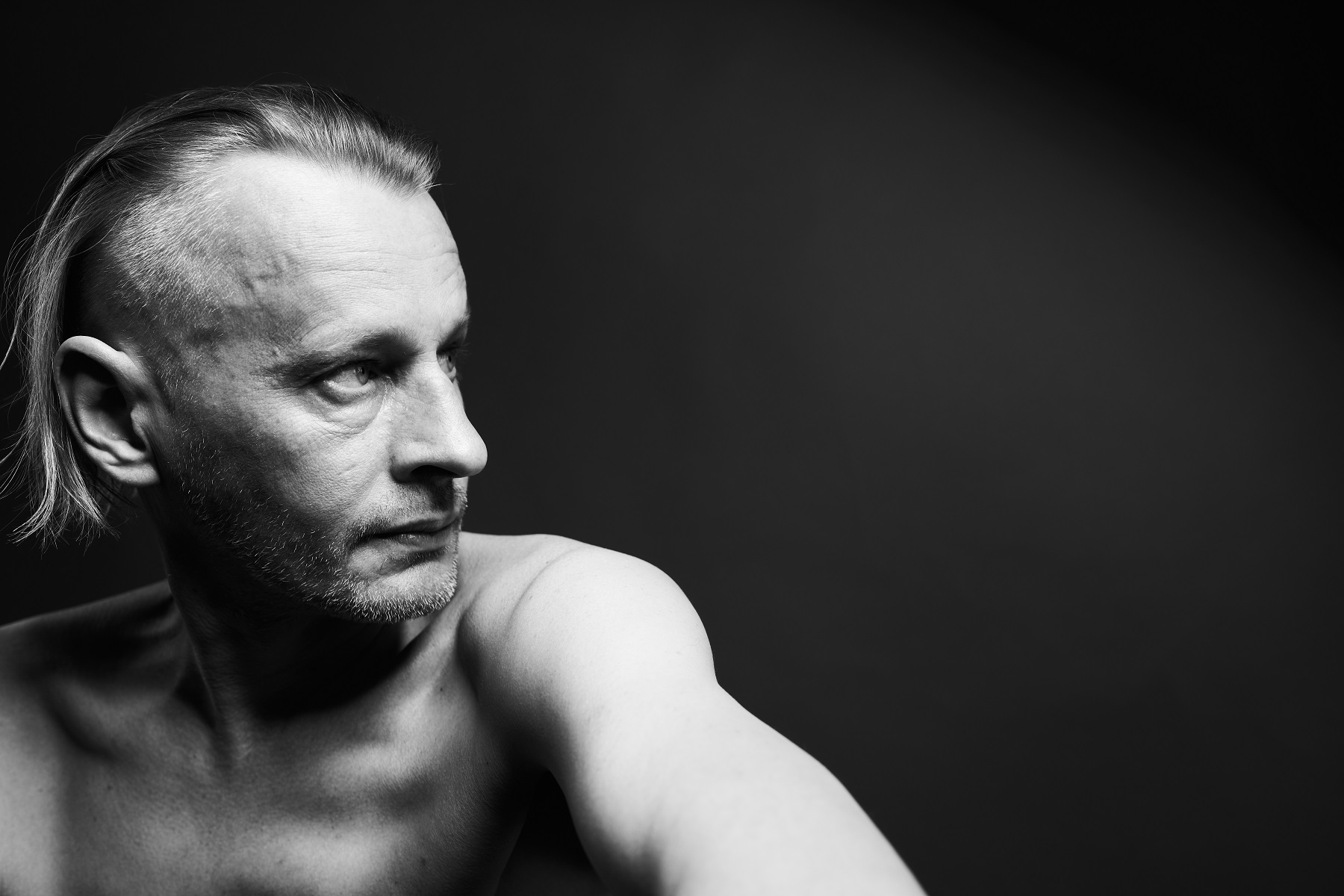
Let's go back to your private life. After almost 20 years of living together, you finally got married this summer…
— I now have two wedding rings [shows on her hands]. The subject of marriage actually arose from the beginning, but I had such an idiotic position that it was possible to live together without any ceremonies there, but Misko insisted, and so often, that at some point I gave up. But I said that everything connected with it is your problem: to buy wedding rings, clothes, to come up with an idea. He did all this: bought me a dress, ordered wedding rings, and then there was a quarantine, a lockdown, and we found time only in June. The two of us had to marry in Truskavetsi. There is a beautiful sanatorium called Carpathians. There is a quick marriage service, a kind of Ukrainian Las Vegas.
Before that, we almost had a honeymoon in Lviv. And here in the Museum of Modernism we stood under the paintings of Tony Denisyuk, and here she herself was.
Misko and her had not seen each other for 20 years. And then we went to Ravsky's workshop, and Tonya asked, "Where are you tomorrow?" — "We are going to Truskavtsi" — "Lord, who is going to that Truskavtsi?" - "We're going to get married." — "Oh, so I'll come, I'll give you my work!". And then another old friend found out and also volunteered.
Well, we arrived in Truskavtsi in a couple of days, gave the documents to this office and asked not to plan us tomorrow, but the day after tomorrow. There was a lake with drinking water, a park, and we rested for two days, joking — who of us would run away, who would be the first to lose the wedding ring.
And here is the wedding day. The wedding should take place at 3 p.m., and at 12 o'clock they call from the marriage office and say: "Mykhailo Yaroslavovych, you know, you won't get married today."
It turned out that the divorce certificate he filed was not his, but his ex-wife's, and the system sees Miska as married. And they say, “You need to go to Lviv, take a document from the court that divorced you, in the archives. Go to the registry office with this document, and you will be issued a divorce certificate there. It takes only 2-3 weeks.”
And here, just like in the movies, he makes such a gesture with his hand and says, "Believe me!". He runs out, catches a taxi, and goes to Lviv. In this taxi, he starts calling all his friends: congressmen, lawyers, journalists, who can help… And he remembers that the drummer he played with has his mother working in the Truskavtsi City Hall. His mother said that no registry office would close until Misko got married…
And while I was nervously smoking on the balcony, looking at the swans and the drinking lake, Misko picked up half of the country. When he got to court by taxi, he was already carrying a piece of paper. The registry office was not far away. He ran there with a piece of paper, then to the bank. Having these papers, he called me — "Get dressed!" The guests are already here. I'm all beautiful with his embroidered shirt in my hands. At 17:00 the registry office had to close, at 17:15 Misko runs out of the taxi, takes off his T-shirt, puts on an embroidered shirt and we came in — and got married.
Listen, for years we have been playing nonconformists, pretending that official marriage does not matter, but situations with illness, death and other relations with the state deny this position.
— Yes, in the end, the marriage seal matters, and I advise not to delay this decision for 15 years because we still live in the state. Well, everyone asked why you got married right now. I don't know, but if we weren't officially married, no one would have given me his body. That's all.
The day after the Misko funeral, I was in Lviv at the Congress of Culture. I have already told you that the organizers of Congress supported my idea and together with the actors of the Lesya Theater read Monologues about What is the Most Important. This was our "secular memorial service" - very humane, especially since the text is about all of us. "Culture is the armed forces."
Memories do not end on social networks. Concerts are being prepared. Are these ways of honoring important to you? And what else can we do to remember?
— They are undoubtedly significant, both for me and for Misko, I think, too. What to do — first of all, listen to music, because it's good music. There were still performances, open projects that we decided to continue, and three pilot issues of a blog about culture (I will present them tomorrow and I will send them). My partners and I decided to continue this blog, and I also recorded three more issues.
Misko really wanted to voice Roman Shved's book Lviv Resident Between Three Occupations, and he was very worried about having time while Roman was still alive… Partners think that this recording should be continued — so there would be the sound of one Misko, and so the sound of one whole theater.
I now think in small steps and in short distances. But it will be a birthday. I know exactly how he wanted to spend it, and everything that was planned by Misko will all happen. These three concerts will take place in Lviv, Monologues will be shown on video in Lyalka, and bands will sing his songs. There will also be jazz. On November 14 there will be a party with the presentation of a new album, 13 Songs about Love, as he wanted. In Kharkiv it will be at the press center Nakipelo. In Lviv at Your City, we will make a teleconference, and we will listen to these songs and talk about them. And on February 17, a concert will be mentioned in the Recording House, and I am very grateful to all my fellow musicians who will come and sing Misko’s songs. I think he smiles there when Vakarchuk says that Miska's early songs influenced and
shaped him. By the way, he chose to sing at the tribute concert We will not Die in Paris and Beautiful Carpathians.
Translated by Kateryna Kazimirova
Misko Barbara is an actor of the Arabesque Theater, a musician, translator, co-founder, and soloist of the Dead Roster band, a legend of Ukrainian rock and roll.